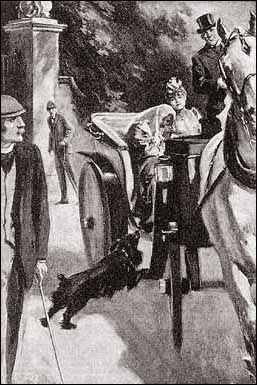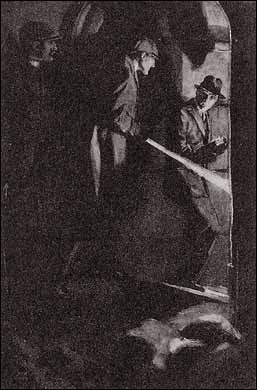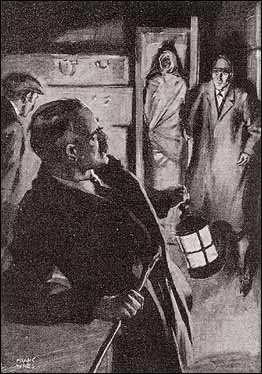| Shoscombe Old Place 4 | Shoscombe Old Place 5 |
In the morning Holmes discovered that we had come without our spoon-bait for jack, which absolved us from fishing for the day. About eleven o’clock we started for a walk, and he obtained leave to take the black spaniel with us.
“This is the place,” said he as we came to two high park gates with heraldic griffins towering above them. “About midday, Mr. Barnes informs me, the old lady takes a drive, and the carriage must slow down while the gates are opened. When it comes through, and before it gathers speed, I want you, Watson, to stop the coachman with some question. Never mind me. I shall stand behind this holly-bush and see what I can see.”
It was not a long vigil. Within a quarter of an hour we saw the big open yellow barouche coming down the long avenue, with two splendid, high-stepping gray carriage horses in the shafts. Holmes crouched behind his bush with the dog. I stood unconcernedly swinging a cane in the roadway. A keeper ran out and the gates swung open.
The carriage had slowed to a walk, and I was able to get a good look at the occupants. A highly coloured young woman with flaxen hair and impudent eyes sat on the left. At her right was an elderly person with rounded back and a huddle of shawls about her face and shoulders which proclaimed the invalid. When the horses reached the highroad I held up my hand with an authoritative gesture, and as the coachman pulled up I inquired if Sir Robert was at Shoscombe Old Place.
At the same moment Holmes stepped out and released the spaniel. With a joyous cry it dashed forward to the carriage and sprang upon the step. Then in a moment its eager greeting changed to furious rage, and it snapped at the black skirt above it.

“Drive on! Drive on!” shrieked a harsh voice. The coachman lashed the horses, and we were left standing in the roadway.
“Well, Watson, that’s done it,” said Holmes as he fastened the lead to the neck of the excited spaniel. “He thought it was his mistress, and he found it was a stranger. Dogs don’t make mistakes.”
“But it was the voice of a man!” I cried.
“Exactly! We have added one card to our hand, Watson, but it needs careful playing, all the same.”
My companion seemed to have no further plans for the day, and we did actually use our fishing tackle in the mill-stream, with the result that we had a dish of trout for our supper. It was only after that meal that Holmes showed signs of renewed activity. Once more we found ourselves upon the same road as in the morning, which led us to the park gates. A tall, dark figure was awaiting us there, who proved to be our London acquaintance, Mr. John Mason, the trainer.
“Good-evening, gentlemen,” said he. “I got your note, Mr. Holmes. Sir Robert has not returned yet, but I hear that he is expected to-night.”
“How far is this crypt from the house?” asked Holmes.
“A good quarter of a mile.”
“Then I think we can disregard him altogether.”
“I can’t afford to do that, Mr. Holmes. The moment he arrives he will want to see me to get the last news of Shoscombe Prince.”
“I see! In that case we must work without you, Mr. Mason. You can show us the crypt and then leave us.”
It was pitch-dark and without a moon, but Mason led us over the grass-lands until a dark mass loomed up in front of us which proved to be the ancient chapel. We entered the broken gap which was once the porch, and our guide, stumbling among heaps of loose masonry, picked his way to the corner of the building, where a steep stair led down into the crypt. Striking a match, he illuminated the melancholy place – dismal and evil-smelling, with ancient crumbling walls of rough-hewn stone, and piles of coffins, some of lead and some of stone, extending upon one side right up to the arched and groined roof which lost itself in the shadows above our heads. Holmes had lit his lantern, which shot a tiny tunnel of vivid yellow light upon the mournful scene. Its rays were reflected back from the coffin-plates, many of them adorned with the griffin and coronet of this old family which carried its honours even to the gate of Death.

“You spoke of some bones, Mr. Mason. Could you show them before you go?”
“They are here in this corner.” The trainer strode across and then stood in silent surprise as our light was turned upon the place. “They are gone,” said he.
“So I expected,” said Holmes, chuckling. “I fancy the ashes of them might even now be found in that oven which had already consumed a part.”
“But why in the world would anyone want to burn the bones of a man who has been dead a thousand years?” asked John Mason.
“That is what we are here to find out,” said Holmes. “It may mean a long search, and we need not detain you. I fancy that we shall get our solution before morning.”
When John Mason had left us, Holmes set to work making a very careful examination of the graves, ranging from a very ancient one, which appeared to be Saxon, in the centre, through a long line of Norman Hugos and Odos, until we reached the Sir William and Sir Denis Falder of the eighteenth century. It was an hour or more before Holmes came to a leaden coffin standing on end before the entrance to the vault. I heard his little cry of satisfaction and was aware from his hurried but purposeful movements that he had reached a goal. With his lens he was eagerly examining the edges of the heavy lid. Then he drew from his pocket a short jemmy, a box-opener, which he thrust into a chink, levering back the whole front, which seemed to be secured by only a couple of clamps. There was a rending, tearing sound as it gave way, but it had hardly hinged back and partly revealed the contents before we had an unforeseen interruption.
Someone was walking in the chapel above. It was the firm, rapid step of one who came with a definite purpose and knew well the ground upon which he walked. A light streamed down the stairs, and an instant later the man who bore it was framed in the Gothic archway. He was a terrible figure, huge in stature and fierce in manner. A large stable-lantern which he held in front of him shone upward upon a strong, heavily moustached face and angry eyes, which glared round him into every recess of the vault, finally fixing themselves with a deadly stare upon my companion and myself.
“Who the devil are you?” he thundered. “And what are you doing upon my property?” Then, as Holmes returned no answer, he took a couple of steps forward and raised a heavy stick which he carried. “Do you hear me?” he cried. “Who are you? What are you doing here?” His cudgel quivered in the air.
But instead of shrinking Holmes advanced to meet him.
“I also have a question to ask you, Sir Robert,” he said in his sternest tone. “Who is this? And what is it doing here?”

He turned and tore open the coffin-lid behind him. In the glare of the lantern I saw a body swathed in a sheet from head to foot, with dreadful, witch-like features, all nose and chin, projecting at one end, the dim, glazed eyes staring from a discoloured and crumbling face.
The baronet had staggered back with a cry and supported himself against a stone sarcophagus.
“How came you to know of this?” he cried. And then, with some return of his truculent manner: “What business is it of yours?”
“My name is Sherlock Holmes,” said my companion. “Possibly it is familiar to you. In any case, my business is that of every other good citizen – to uphold the law. It seems to me that you have much to answer for.”
Sir Robert glared for a moment, but Holmes’s quiet voice and cool, assured manner had their effect.
“ ‘Fore God, Mr. Holmes, it’s all right,” said he. “Appearances are against me, I’ll admit, but I could act no otherwise.”
“I should be happy to think so, but I fear your explanations must be before the police.”
Sir Robert shrugged his broad shoulders.
“Well, if it must be, it must. Come up to the house and you can judge for yourself how the matter stands.”
| Shoscombe Old Place 4 | Shoscombe Old Place 5 |